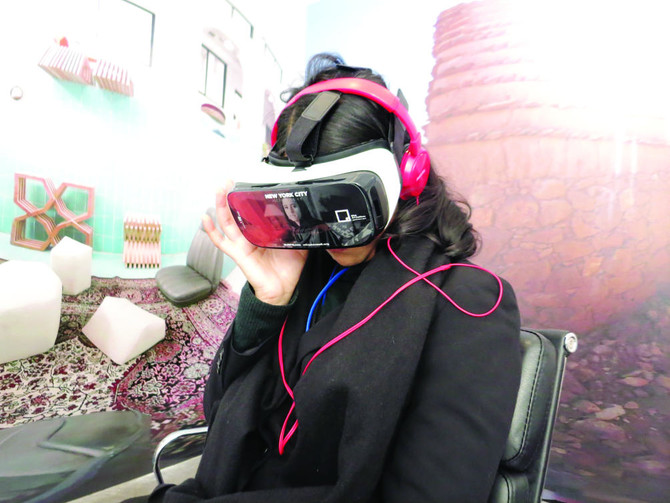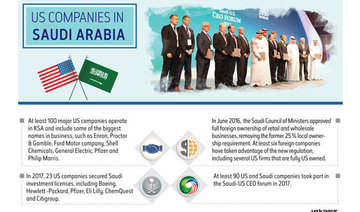NEW YORK: One minute, you are in a fancy gallery on New York’s Park Avenue, the next you are with a Saudi Arabian artist deep in the sands of the Kingdom’s deserts — a 10,000km journey made possible at the press of a button thanks to virtual reality (VR) headsets.
That was the experience of Mariana Souza, a 25-year-old New Yorker, who watched the 15-minute VR documentary at a show in midtown Manhattan on Monday about being an artist in a fast-changing Saudi Arabia.
“It was really interesting to listen to people really from there, rather than watching about them on the news,” Souza told Arab News, after peering into the goggles, tilting her head and spinning around on a rotating chair.
Beside her, everyone from teenagers to pensioners was trying out the VR headsets, swinging their heads around as they listened to Saudi artists describing the relaxing of cultural rules in a conservative society.
“It’s kind of showing people who might not be aware of what’s going on over there that it’s a modern culture as well as an ancient culture — people usually think that’s it’s just one or the other,” Souza said.
“It shows a balance and how people there respect their past and are also moving forward.”
In the documentary, artists describe how reforms are changing life for women, and how a cultural and religious prohibition on depicting people has been loosened, opening doors for painters, sculptors and other artists.
“I’m telling the story of a changing society through the perspective of its artists, using a similar language to what the artists use every day,” Matteo Lonardi, the Italian filmmaker who directed the VR film, told Arab News.
“It’s about a moment where nobody knows what will happen. A moment in the middle, a limbo, where people have lots of expectations, without knowing exactly what to expect. A moment to push their boundaries, but nobody knows how far they can push them.”
The high-tech art show, called “Reframe Saudi,” runs at Phillips auctioneers on Park Avenue from 10 a.m. to 6 p.m. daily until Thursday. It features Lonardi’s documentary and the works of some two dozen Saudi artists.
Ahmed Mater, director of the Misk Art Institute, which organized the display, said it showed Manhattanites “how art and the creative industries are an integral part of the change that is transforming Saudi Arabia.”
“It is essential at this time that Saudi artists engage with audiences around the world, as they are here in New York, to help to tell the continuing story of change in Saudi Arabia,” said Mater, a Saudi doctor-turned-artist from Tabuk who works in film and photos.
The show dovetails with the visit of Crown Prince Mohammed bin Salman, who was in New York on Monday meeting Wall Street money men on his first official visit to the US since becoming King Salman’s heir last year.
Ayesha Malik, 28, a Saudi-born Pakistani-American photographer who documents the similarities between the lives of everyday folk in Saudi Arabia and America, described a burgeoning arts scene in the Kingdom.
"It’s a historic time and just exceptionally exciting to be an artist as society opens up as we create more galleries and art collectives. I came across a feminist art exhibition a few years ago and it’s just impressive that we’re seeing more and more of this kind of creativity nowadays,” Malik told Arab News.
“The opening of movie theatres means that Saudi filmmakers can now think about airing their work in their home country. There are fewer restrictions on concerts for musicians. It’s great to think that the country is opening doors for you rather than trying to close them."
The Misk Art Institute is tasked with turning Saudi Arabia into a home for grassroots cultural creativity, diplomacy and global exchanges via art festivals, workshops and competitions for fledgling Saudi artists.
The VR documentary is accompanied by a display of artworks by some two dozen artists from across the country, including bespoke Al-Qatt Al-Asiri mural paintings by women artists from southern Saudi Arabia.
Ali Moghawi, a New York-based Saudi writer involved in the murals, told Arab News that the Asir region’s tradition “deserves to be documented and spread” and is an “amazing catalyst for all those interested in art and museums.”
“For decades, reviving Al-Qatt Al-Asiri traditional art was no more than a dream,” Moghawi said.
“Now, we witness the realization of this dream as we are provided with an international platform where we can share it and provide art lovers and enthusiasts with the opportunity to behold the beauty of this ancient art and delve into its shapes, colors and geometric angles.”
Last year, the UN’s cultural wing, UNESCO, inscribed the Saudi tradition of group mural painting on its prestigious list of “intangible cultural heritage,” alongside the time-tested skills of falconry and throwing good pizza dough.


New Yorkers strap on virtual reality goggles for Saudi culture
New Yorkers strap on virtual reality goggles for Saudi culture

Saudi foreign minister receives written message from Russian counterpart

- Russian ambassador delivers message to Saudi deputy minister of foreign affairs
LONDON: Saudi Minister of Foreign Affairs Prince Faisal bin Farhan received a written message from his Russian counterpart, Sergey Lavrov, regarding relations between the two countries, the Saudi Press Agency reported.
The message was received on behalf of Prince Faisal by Waleed Al-Khuraiji, the Saudi deputy minister of foreign affairs, during a meeting with Sergey Kozlov, the Russian ambassador to the Kingdom, in Riyadh on Wednesday.
During the meeting, officials discussed Saudi-Russian relations and ways to enhance ties in various fields, the SPA added.
© 2026 SAUDI RESEARCH & PUBLISHING COMPANY, All Rights Reserved And subject to Terms of Use Agreement.














